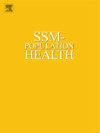社区社会经济背景介导不良童年经历与成年后社会风险和健康结果之间的关联
IF 3.1
2区 医学
Q1 PUBLIC, ENVIRONMENTAL & OCCUPATIONAL HEALTH
引用次数: 0
摘要
虽然童年逆境对健康的长期影响是公认的,但很少有研究调查社区水平的条件如何塑造童年不良经历(ace)与成年后社会风险和健康结果之间的关系。了解这些关系可以为有针对性的、基于地点的干预提供信息,以改善暴露后数十年的健康和社会风险结果。本研究探讨社区社会经济背景如何影响童年逆境与成年社会风险和健康结果之间的关系。利用2021年加州健康访谈调查(CHIS)的数据,我们分析了18612名成年人的样本,这些成年人代表了加州的成年人口。Karlson-Holm-Breen (KHB)方法将童年逆境的影响分解为成年后邻里社会经济环境介导的直接效应和间接效应。研究结果表明,ACE分数越高,住房和食品不安全状况越严重,自我评估的健康状况越差,尤其是在拥有4个或更多ACE分数的个人中。社区社会经济背景在ace与结果之间的关系中起着很小但很重要的作用。针对急性呼吸道感染的政策举措应考虑到社区环境在应对社会风险和健康结果方面的重要性。本文章由计算机程序翻译,如有差异,请以英文原文为准。
Neighborhood socioeconomic contexts mediate the association between adverse childhood experiences and social risk and health outcomes in adulthood
Although childhood adversity's long-term effects on health are well recognized, few studies examine how community-level conditions shape the relationships between adverse childhood experiences (ACEs) and social risk and health outcomes in adulthood. Understanding these relationships can inform targeted, place-based interventions to improve health and social risk outcomes decades after ACEs exposure. This study explored how neighborhood socioeconomic contexts influence the relationships between childhood adversity and adulthood social risk and health outcomes. Using data from the 2021 California Health Interview Survey (CHIS), we analyzed a sample of 18,612 adults, representative of California's adult population. The Karlson-Holm-Breen (KHB) method decomposed childhood adversity's effects into direct and indirect effects mediated by neighborhood socioeconomic contexts in adulthood. Findings indicated higher ACE scores were associated with increased housing and food insecurity, and poorer self-rated health, particularly among individuals with four or more ACEs. The neighborhood socioeconomic context mediated a small but significant portion of the relationship between ACEs and the outcomes. Policy initiatives addressing ACEs should consider the importance of neighborhood contexts in addressing social risk and health outcomes.
求助全文
通过发布文献求助,成功后即可免费获取论文全文。
去求助
来源期刊

Ssm-Population Health
PUBLIC, ENVIRONMENTAL & OCCUPATIONAL HEALTH-
CiteScore
6.50
自引率
2.10%
发文量
298
审稿时长
101 days
期刊介绍:
SSM - Population Health. The new online only, open access, peer reviewed journal in all areas relating Social Science research to population health. SSM - Population Health shares the same Editors-in Chief and general approach to manuscripts as its sister journal, Social Science & Medicine. The journal takes a broad approach to the field especially welcoming interdisciplinary papers from across the Social Sciences and allied areas. SSM - Population Health offers an alternative outlet for work which might not be considered, or is classed as ''out of scope'' elsewhere, and prioritizes fast peer review and publication to the benefit of authors and readers. The journal welcomes all types of paper from traditional primary research articles, replication studies, short communications, methodological studies, instrument validation, opinion pieces, literature reviews, etc. SSM - Population Health also offers the opportunity to publish special issues or sections to reflect current interest and research in topical or developing areas. The journal fully supports authors wanting to present their research in an innovative fashion though the use of multimedia formats.
 求助内容:
求助内容: 应助结果提醒方式:
应助结果提醒方式:


